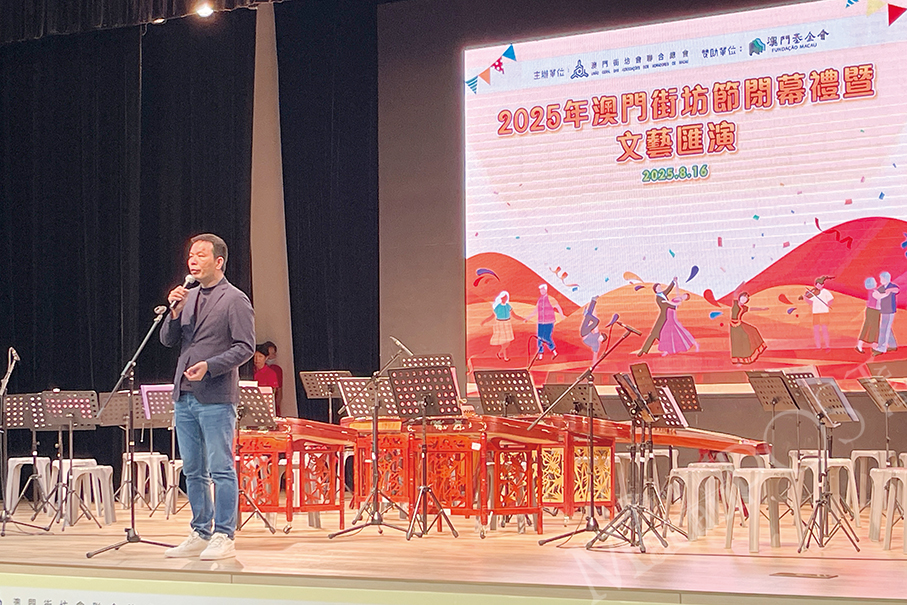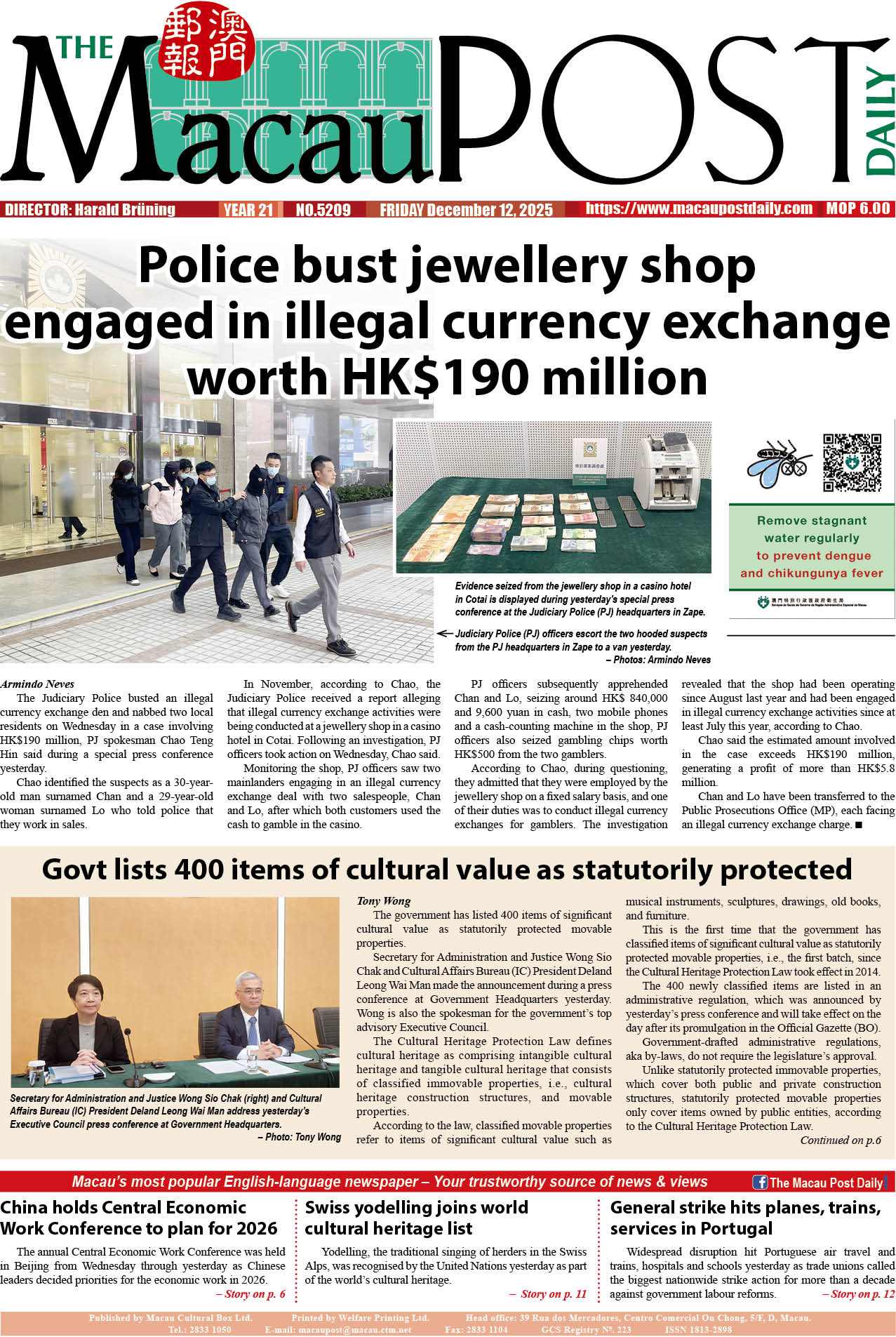Editorial
When Chief Executive Ho Iat Seng delivers his 2021 Policy Address in the legislature’s hemicycle this afternoon I expect him to adhere to President Xi Jinping’s exhortation to always follow the principle of “people first” in coordinating COVID-19 epidemic control and economic and social development.
Xi underlined the people-centred concept in his speech on the first day of this year’s legislative session of the National People’s Congress (NPC) on May 22.
In the speech, the president also expressed the central authorities’ willingness “to protect people’s lives and health at all costs.”
Of course, the financial and economic cost to get the virus under control has been tremendous, not to mention the human suffering. The Chinese mainland and Macau have been remarkably successful in suppressing the spread of COVID-19, Taiwan has done quite well, while Hong Kong is still struggling to get a handle on the virus.
Of course, Macau’s accomplishments on the anti-virus front have come at a great cost to the local economy. That’s why thriftiness needs to remain the guiding light for the government.
The government’s 2021 budget bill’s explanatory remarks acknowledge that Macau’s economic situation will continue to be “critical” next year. That’s why the government has asked lawmakers to green-light its proposed recourse to 26.58 billion patacas from the financial reserves of the Macau Special Administrative Region (MSAR), accounting for 27.6 percent of its expected receipts of 96.06 billion patacas in 2021. The proposed budget’s expected expenditure amounts to 95.21 billion patacas.
Some legislators have wondered aloud whether the government’s (kind of) deficit spending due to the COVID-19 menace could amount to a breach of Article 105 of the Macau Basic Law (MBL) which states that the MSAR “shall follow the principle of keeping expenditure within the limits of revenues in drawing up its budget, and strive to achieve a fiscal balance, avoid deficits and keep the budget commensurate with the growth rate of its gross domestic product.” (Emphasis added).
Well, the article clearly states that the MSAR (through its executive arm) shall “strive” to achieve a fiscal balance. I remember from the MBL drafting process between 1988 and 1993 that Article 105’s workability raised some eyebrows among its 59 drafters. The point is that particular situations at certain points of time might come up when it will be impossible for the government to achieve a fiscal balance, avoid deficits and keep the budget commensurate with the GDP growth rate. That’s why the MBL article’s wording should be carefully considered, the word “strive” (力求) in particular.
The MSAR’s financial reserves amount to around 600 billion patacas, certainly a handsome amount that would leave even major economies with green envy. However, one should not mistake our city’s financial reserves for a rainy-day fund in their entirety. For instance, large parts of the financial reserves have been set aside to regulate the local economy’s currency and money supply. These assets are not supposed to end up in the government’s budgets. That’s why comparisons such as that the MSAR’s financial reserves would be large enough to cover the government’s annual budgets for an X number of years without any receipts are a fallacy.
Based on the “people first “ principle, the 2021 budget bill has earmarked 8.37 billion patacas for support measures directly benefitting residents, such as the annual wealth-sharing handout, healthcare vouchers and old-age allowances and pensions, aside from tax deductions and waivers amounting to 2.7 billion patacas. Macau’s old-age poverty continues to be a problem unseemly for an economy with one of the world’s highest per capita GDPs (US$79,977 in 2019).
Macau has become a novel coronavirus-free “oasis” thanks to a string of government measures as well as social discipline, such as the still almost universal wearing of facemasks and a near-blanket ban on non-resident foreigners’ entry since March.
What Macau needs is “smart living with COVID-19” (the title of a seminar held in Bangkok on Friday mentioned in a weekend article by the Bangkok Post – one of my favourite newspapers – about a proposal to reduce the mandatory quarantine for foreign tourists from 14 to 10 days that will be put forward to Thailand’s Centre for COVID-19 Situation Administration for consideration this week).
Yes, indeed, we do need “smart living with COVID-19” for the simple reason that the pandemic can be expected to continue well into next year and even beyond.
A Bangkok Post reader reacted to the article by insisting that “a stopped economy is killing people more surely than any virus, through unemployment and loss of jobs causing poverty”. The reader also maintained that “COVID is easy to fight, but once installed, poverty is extremely hard and difficult to fight.”
I beg to differ – even though I respect his or her viewpoint. “People first” is what I think is the right approach towards tackling the novel coronavirus threat. Ultimately, “people first” also benefits the economy, perhaps not in the short but certainly in the medium and long run. Any economy is the product of human endeavour. Healthy and happy people are in a much better position to propel socio-economic development forward than those stricken by, or scared of, COVID-19.
Macau’s ban on foreign arrivals – both tourists and non-resident workers – should only be lifted after painstaking consideration. The potential infection risk is simply too high. Quite rightly, mainlanders have been allowed back into Macau without having to undergo quarantine since last month, considering that the mainland has succeeded in becoming a low-risk COVID-19 area. Last year, mainlanders accounted for nearly 71 percent of Macau’s 39.4 million visitor arrivals. Hongkongers, who made up 18.5 percent of all visitor arrivals last year, should only be permitted to enter Macau without quarantine when their special administrative region has officially been declared a low-risk COVID-19 area. Until then, anything else would be irresponsible. For the benefit or our health, the launch of a travel bubble between the two SARs must wait. I am saying that as someone who “can’t wait” to go on a book-buying trip to Hong Kong – but as a realist I know that it’s better for all of us to wait a bit more. For safety’s sake, let’s be patient.
As a long-time local resident, I am nevertheless upbeat about our city’s ability to get through all this relatively unscathed. I take the liberty of quoting a proverb that a Macanese friend told me back in the 1980s when I was still a greenhorn as far as Macau’s very own way of dealing with challenges was concerned: “Despite everything and everyone, Macau will always be Macau.”
That’s it!
– Harald Brüning







